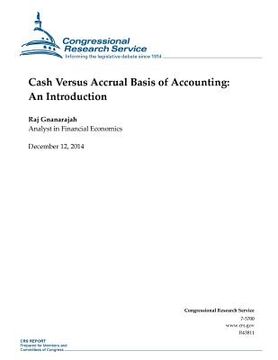Reseña del libro "Cash Versus Accrual Basis of Accounting: An Introduction (en Inglés)"
This report introduces two general methods of accounting-the cash basis method and accrual basis method. The choice of accounting method determines the timing of the recognition of revenue and expenses. Under cash basis accounting, revenue and expenses are recorded when cash is actually paid or received. Under accrual basis accounting, revenue is recorded when it is earned and expenses are reported when they are incurred. Understanding the differences between these two accounting methods could be helpful to Congress as it considers reforming the tax system and changing the federal government's financial reporting requirements. Currently with certain exceptions, the Internal Revenue Code (IRC) requires some companies with gross receipts in excess of $5 million to use accrual basis, instead of cash basis, of accounting to determine their tax liabilities. The IRC's requirement to use the accrual method, arguably, ensures that revenue and the expenses incurred to generate that revenue are realized in the same year. Types of companies that may be excepted from using accrual basis of accounting for income taxes are sole proprietors and certain qualified personal service corporations (PSCs) in such fields as health, law, engineering, accounting, performing arts, and consulting firms, as well as farms that are not corporations or do not have a corporate partner. Some Members of Congress have put forth proposals to revise the circumstances under which certain companies are able to use cash method. House Ways and Means Committee Chairman Dave Camp introduced H.R. 1, the Tax Reform Act of 2014, on December 10, 2014. Among the changes proposed in the bill is the requirement that some partnerships, S corporations, and PSCs use the accrual method instead of the cash method to determine their federal taxable liability. Specifically, these business types would be required to use the accrual method if their average annual gross receipts exceeded $10 million. Former Senate Committee on Finance Chairman Max Baucus included a similar provision in his Cost Recovery and Accounting staff discussion draft, which has not been formally introduced as legislation. The Small Business Accounting and Tax Simplification Act (H.R. 947), Start-up Jobs and Innovation Act (S. 1658), and Small Business Tax Certainty and Growth Act (S. 1085), introduced in the 113th Congress, would raise the gross receipt test limit from $5 million to $10 million. The President's budget is prepared primarily using cash basis. The Financial Report of the United States Government is prepared using both accrual and modified cash basis. For the past 17 years, the Government Accountability Office (GAO) has issued a disclaimer of opinion on the Financial Report of the United States Government. One of the reasons stated by GAO for the disclaimer of opinion for the 2013 financial report was that the federal government's process for preparing the consolidated financial statements was ineffective to determine whether the financial reports were presented fairly in accordance with U.S. Generally Accepted Accounting Principles (GAAP). A number of congressional proposals would change how the U.S. government's financial reports are prepared. In the 113th Congress, the GAAP Act (H.R. 476) and H.Res. 545 would require the federal government's budget, financial reports, and performance evaluation reports to be prepared using both cash and accrual method. This report introduces the difference between cash and accrual methods by providing an overview of concepts and theories that underlie these accounting methods. It then explores these concepts through the business cycle of a fictitious small business and how the basis of accounting would affect the financial condition of the business.

